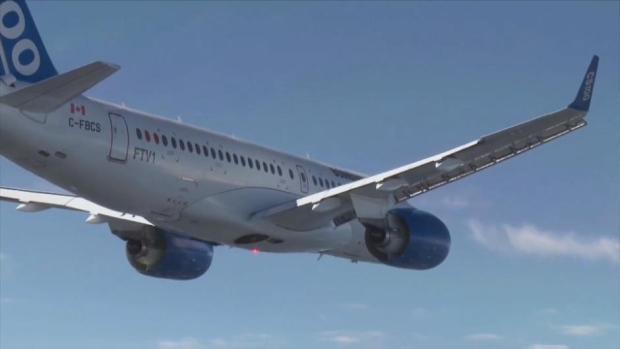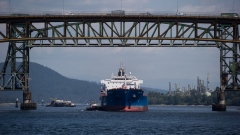Dec 14, 2016
Three questions for Bombardier as it prepares to face investors
By Paige Ellis

“You have to get the orders in the door,” Chris Murray, an analyst at AltaCorp Capital, told Bombardier executives. “[How will you] address that issue?”
It was late November, 2015, and Bombardier hadn’t booked a firm CSeries order in over a year.
On that crisp day in New York City, executives – several of whom were less than a year on the job – worked hard to placate impatient investors.
“There’s no question that we need to advance the program with additional orders,” admitted Fred Cromer, president of Bombardier’s commercial aircraft division. “We’re being very selective about the airlines that we’re talking to.”
One year and two blockbuster orders later, Bombardier is back from the brink. And yet, management is still dogged by questions about the future of the CSeries jet program.
As executives prepare for Bombardier’s next investor day session, scheduled for Thursday in New York, RBC Capital Markets analyst Walter Spracklin believes expectations are still low, but steadily improving.
“Management will again have an opportunity to help restore investor confidence,” he wrote in a recent report to clients.
Here are three burning questions the company must address:
1. What is the future of CSeries production, orders and development?
Years behind schedule and billions of dollars over budget, Bombardier CSeries jets once “threatened to bankrupt the company,” Morningstar Analyst Chris Higgins wrote in a recent report.
But 2016 was a watershed year for the beleaguered program.
In April, Bombardier secured an order for as many as 125 CSeries planes from Delta Air Lines – the marquee customer it desperately craved. A few months later, it finalized an order from Air Canada for up to 75 jets.
With both the CS100 and larger CS300 now certified and in the hands of launch customers Swiss Air and airBaltic, investors and analysts are focused on production.
“CSeries faces a very tough ramp-up phase,” Fadi Chamoun, an analyst at BMO Capital Markets, told BNN via email. “It requires a significant amount of capital [and] a significant amount of coordination with thousands of suppliers in the supply chain.”
One of those suppliers has already thrown a wrench in Bombardier’s production plans.
Early this fall, Pratt & Whitney revealed the planes’ engines are delayed, forcing Bombardier to slash its delivery forecast for 2016.
Though Bombardier has previously assured investors it is still on track to deliver between 30 and 35 CSeries jets in 2017, analysts are seeking greater clarity.
“We want to make sure the cadence of deliveries of CSeries is going to normalize,” said Nick Heymann, analyst at William Blair, in a phone interview with BNN.
Executives are also expected to field questions about CSeries sales.
“Everybody is looking for where the next order is coming from,” Heymann added. “A mystery has been why there hasn't been any orders coming out of China. That would seem to be a fertile market.”
Finally, investors and analysts may press management on the prospect of developing a third CSeries jet – namely, the CS500.
“The guys at British Airways and Delta have said, ‘If [Bombardier] did a 500, we’d look at it very seriously’,” said AltaCorp’s Murray. “The problem is [Bombardier] doesn’t have money to do it. That's where the request for government money comes in.”
In fact, RBC’s Spracklin believe any form of federal funding would be contingent on Bombardier developing a new jet.
“However, as Bombardier is in the midst of ramping up production… we do not believe an announcement on a larger CSeries variant is imminent.”
2. Will the Donald Trump presidency boost prospects for Bombardier’s business jet division?
In early November, Bombardier’s latest business jet completed its maiden flight.
The Global 7000 -- which features a swanky, customizable cabin and boasts a range of 13,705 kilometres -- is considered vital to Bombardier’s corporate jet division.
“The Global 7000 is a segment-defining jet,” the company recently wrote in its annual report. “It will be Business Aircraft’s key source of growth in the years to come.”
Since joining Bombardier, CEO Alain Bellemare has scaled back the company’s portfolio of business jets.
Amid weak demand in previously-robust foreign markets, he cancelled the Learjet 85 program and, most recently, announced plans to intermittently pause work on the Global 5000 and 6000 in 2017.
Bombardier denies any more business jets are on the chopping block, but analysts are skeptical.
“Demand is uncertain given the bumpy state of the global economy. Will Bombardier have to make any significant build-rate changes?” David Tyerman, an analyst at Cormark Securities, told BNN via email.
“They're probably going to kill the Global 8000,” reckons AltaCorp’s Murray. “The vast majority of the orders for the 7000 and 8000 are for the 7000. Would you put more money into it if you didn't have to?”
But there could be a tailwind for Bombardier’s corporate jet business in the form of Donald Trump.
“Ever since Trump was elected, the things we look at – like sentiment indices – have all gone vertical,” noted Murray.
With Trump’s pro-business agenda, which includes a promise to cut corporate tax rates, U.S. demand for business jets could take off.
And then there’s the made-in-America advantage. Though Bombardier is proudly Canadian, the company has a strong manufacturing, maintenance and service presence in the U.S.
“Increasingly if you want to sell in the U.S. you have to be in the U.S.,” said Heymann.
- Bombardier expects another substantial CSeries order in 2017, executive says
- Bombardier wins US$370M contract from French national railway
- Bombardier wins 8-year, $331M rail contract from Montreal
RELATED CONTENT
3. How will the company ensure its debt load doesn’t impede innovation?
Though Bombardier’s commercial and business aircraft divisions will likely be the elephants in the room at the company’s investor day meeting Thursday, Chamoun says there will also be a sizable “hippo”: the company’s debt.
“With nearly $10 billion of debt, including pension deficit, the company can't invest and could potentially lose its R&D force – which is the heart of the company,” he told BNN.
In its most recent quarterly report, Bombardier highlighted it doesn’t have any significant debt coming due before 2018.
It also returned to the bond market in November – the first time since February 2015 – raising US$1.4 billion.
Along with the recent cash infusions from the Quebec government, Morningstar’s Higgins believes the company “can weather the estimated $2 billion of cash the C Series program will burn over the next several years.”
But can it innovate?
“Engineers will go elsewhere,” according to Chamoun. “And all this intelligence and experience [that] earned these great aircraft declines.”
AltaCorp’s Murray believes the brain drain may already be underway. “All of those really, really smart engineers have gone down to Gulfstream,” he said.
Chamoun, for his part, believes Bombardier’s balance sheet is in desperate need of restructuring. “Is the Beaudoin family standing in the way of making these tough decisions?”









